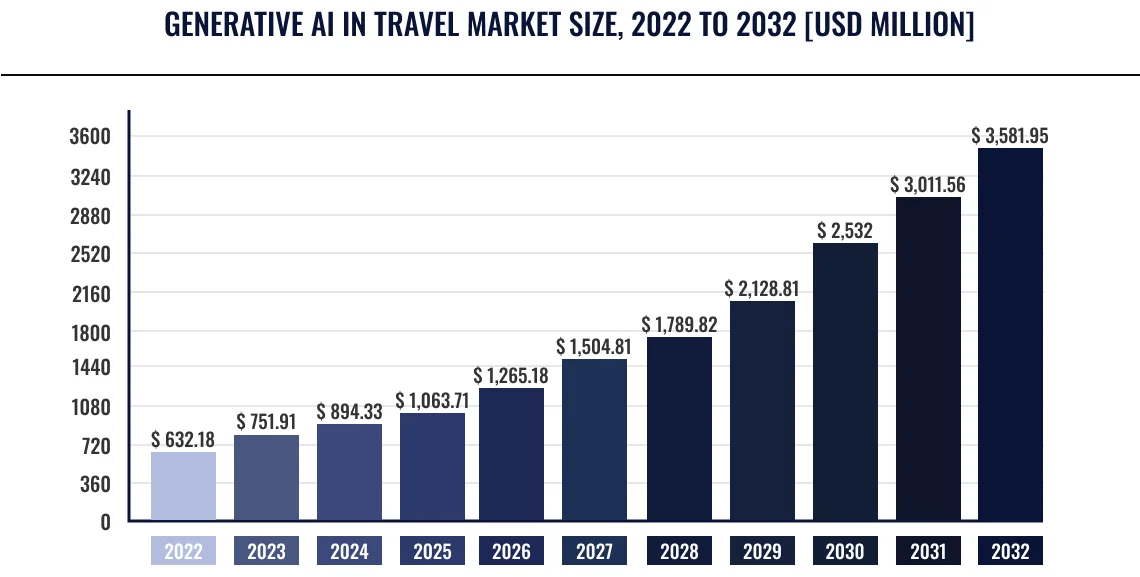How AI in Travel is Transforming the Way We Explore the World?
- AI/ML
- January 1, 2024
Owning a travel planning and accommodation business like TripAdvisor or Airbnb? Then it’s a must to be creative, strategic, and analytical about giving trip recommendations and best deals to your customers by utilizing data. When it comes to data, what can be a better tech solution than employing AI? Read our guide on AI in travel to explore ways it can benefit your travel business.
The ever-evolving travel industry has always been at the front when it comes to embracing innovation. Currently, it is undergoing a metamorphosis, thanks to the adoption of AI in travel. Now, travelers don’t have to spend hours planning their itinerary or wondering if they’ve missed out on hidden gems of their chosen destination.
Travel AI takes care of all important aspects, from suggesting the best flight options to curating a list of must-visit local spots. It’s like having a personal travel assistant in your pocket. Well, AI’s influence doesn’t end here. There are a lot more things AI is changing in the travel industry, making trips more adventurous, exciting, convenient, and memorable.
In this blog, we have analyzed AI’s impact on the travel industry, outlining its usage and benefits. Stay tuned with us to know how the technology will take the industry forward.
Role of AI in Travel Industry’s Growth and Expansion
In recent years, AI in the travel industry has experienced substantial growth. According to the Precedence Research reports, in 2022, the global market for generative AI in the travel industry was valued at approximately USD 632.18 million.

Over the next decade, it is anticipated to experience substantial growth, reaching an estimated value of around USD 3581.95 million by 2032. The growth is expected to occur at a consistent (CAGR) of 18.94% during the estimated period of 2023 to 2032.
North America captured the highest market share, and Asia Pacific countries are said to hold significant market share shortly. Increased demand for personalized travel experiences and rising customer expectations for seamless and convenient travel are the key growth drivers.
Currently, AI is being used to gain a competitive edge, meet evolving customer demands, health screening, predictive maintenance, pricing strategies, monitoring, and enforcement of security protocols. These usages have expanded the industry’s growth and incorporated innovation into it.
Uses of AI in Travel Industry
Artificial Intelligence (AI) has made significant inroads into the travel industry, offering numerous benefits for both travelers and service providers while boosting customer experience. Here are some ways AI is helpful in the travel industry:
AI-powered Chatbots
AI-powered chatbots provide round-the-clock customer support and respond to common queries related to travel inquiries, booking status, flight information, or hotel reservations. They also break the language barrier and assist travelers in communicating in multiple languages.
During the trip, chatbots continue to be valuable companions and provide local insights, language translation, and emergency assistance. They help gather user feedback, support marketing efforts through targeted promotions, and collect valuable data for analytics.
Virtual Agents
Like AI chatbots, Virtual agents are also conversational AI systems, but they have different scopes and capabilities. They are designed to surpass the limitations of AI chatbots and assist with various aspects of a user’s journey or experience. They leverage AI and ML to handle natural language understanding and generation.
Virtual agents can learn and adapt over time, offering more conversational and personalized interactions. They access external data sources, provide recommendations, perform complex tasks, help with booking or rebooking flights and accommodations, compare prices, manage itineraries, send reminders, and during emergencies or cancellations of reservations.
Predictive Analytics
Travel AI employs predictive analytics to anticipate future trends and events by analyzing vast amounts of historical and real-time data. It can forecast travel demand, customer behavior, inventory management, and even potential disruptions based on the algorithms.
AI in the travel industry enables travel companies to optimize pricing, resource allocation, marketing, and crisis management. It increases efficiency, revenue, and customer satisfaction while providing travelers with more informed decision-making tools and personalized travel options.
Real-time Updates
Travel AI algorithms take data and use advanced technology to provide real-time updates to both travelers and travel companies. AI systems aggregate data from various sources, including airlines, hotels, weather services, and travel agencies. The data contains flight schedules, weather conditions, traffic information, etc.
It continuously monitors the data in real-time to identify changes and updates and track transportation delays, gate changes, time changes, weather disruptions, and route closures. Travel mobile apps offer the advantage of receiving alerts, emails, or SMS and push notifications generated by Travel AI systems for travelers.
It also tailors notifications to the specific needs and preferences of travelers and also gives emergency alerts related to natural disasters or political unrest. This use of AI in the travel industry reduces uncertainty and stress, helps travel companies maintain transparency, and provide exceptional customer service.
Personalized Travel Recommendations
AI in the travel industry leverages user data, ML algorithms, natural language processing, and contextual information to provide highly personalized travel recommendations. AI travel app algorithms analyze user profiles, preferences, and past behaviors to suggest destinations, accommodations, activities, and dining options that align with the traveler’s tastes and interests.
Along with it, travel AI’s features, like collaborative filtering and content analysis, compare user preferences of similar travelers to refine these recommendations. Continuous updation, monitoring, and feedback loops keep recommendations up-to-date and relevant. So, users can explore new and exciting destinations and create personalized itineraries, making journeys worth cherishing.

Data Processing and Data Analysis
The use of AI in the travel industry helps analyze customer data, like past user behavior and travel experience. Based on the collected data, it provides personalized recommendations for flights, hotels, and activities. Along with it, AI analyzes historical and real-time data in vast amounts to help travel and tourism companies adjust pricing in real time.
Travel AI algorithms help them optimize revenue and occupancy rates. For price estimation, these dynamic pricing algorithms consider important factors, like demand, competitor pricing, and historical trends, and set the most competitive pricing, increasing bookings and customer engagement.
Smart Baggage Handling
AI-driven systems take the support of RFID (Radio-Frequency Identification) and GPS technology to track baggage in real time. Passengers can monitor their bags’ location and receive notifications on their smartphones to avoid the chance of theft, exchange, and other issues.
Moreover, airports and airlines can use this data for better inventory management and operational efficiency. AI in travel also streamlines the check-in process, baggage sorting, security screening, baggage reconciliation, etc.
These systems allow passengers and concerned authorities to tag luggage bags, identify discrepancies and issues, and safely drop them off. The technology also helps filter oversized or prohibited items and alert passengers or staff as needed. These advancements ensure uptight security and eliminate the risk of mishandling.
Travel Disruption Management
AI algorithms analyze historical data, weather forecasts, and other relevant information to predict potential disruptions like weather-related delays, airport closures, or strikes, helping travel companies plan for contingencies. It provides real-time updates related to flight status, weather conditions, delays, disruptions, and emergencies, helping airlines and airports to respond and make adjustments quickly.
During disruptions, AI in travel also helps with resource allocation optimization, like gates, aircraft, and staff. AI also assists during emergencies and performs post-disruption analysis to identify root causes and areas for improvement.
Employee Management Schedulers
AI in the travel industry predicts future demand for services and helps businesses recruit the right number of employees to meet customer needs efficiently. It also supports creating optimal shift schedules after taking employee availability, skills, experience, and labor laws into consideration.
With travel AI algorithms, companies can make real-time adjustments to schedules to respond to unexpected situations, changes in demand, or staffing. For example, if a flight is delayed or a hotel experiences a sudden influx of guests, AI can recognize the need for additional staff and adjust schedules accordingly.
Monitoring Health and Safety
AI systems can screen passengers and employees for elevated body temperatures to identify potential health risks and direct the person for further testing. These systems can screen passengers and trace their contacts, location data, travel history, records, and other required information to help authorities take proactive measures on time.
AI in the travel industry also provides risk assessments and recommendations for travelers, airlines, and hospitality companies. It ensures compliance with safety regulations and protocols, monitors surveillance cameras and sensor data, processes information from multiple sources, gives emergency alerts, and assists in emergency response efforts.
As we reflect on the future of travel, it’s evident that AI is our passport to a world of boundless possibilities. It’s reshaping the industry, enhancing travel experiences, and leading travelers toward an exciting future where travel is not just a destination but an immersive, AI-driven adventure.
So, opt for AI development services and let’s embrace this revolution and welcome the AI-powered future of travel with open arms. Let’s allow it to guide us toward new horizons, uncharted territories, and unforgettable memories. MindInventory can be a part of this journey, helping you embrace AI through travel app development.

Why is MindInventory the Right Choice for Travel App Development with AI Integrations?
With a track record of delivering cutting-edge mobile applications across various industries, MindInventory boasts extensive experience in crafting robust and feature-rich travel apps. We are a reputed digital transformation services company possessing expertise in integrating artificial intelligence technologies. You can hire AI developers from our team to create AI-integrated, smart, and efficient travel apps that can offer personalized recommendations, predictive analytics, and other advanced features.
We understand that every travel business is unique, that’s why we offer end-to-end AI & ML development services that align perfectly with your vision and goals. MindInventory keeps you ahead of the competition by delivering secure, stable, and user-friendly apps. With rigorous testing and validation procedures in place, you can have confidence in the quality of the final product.













